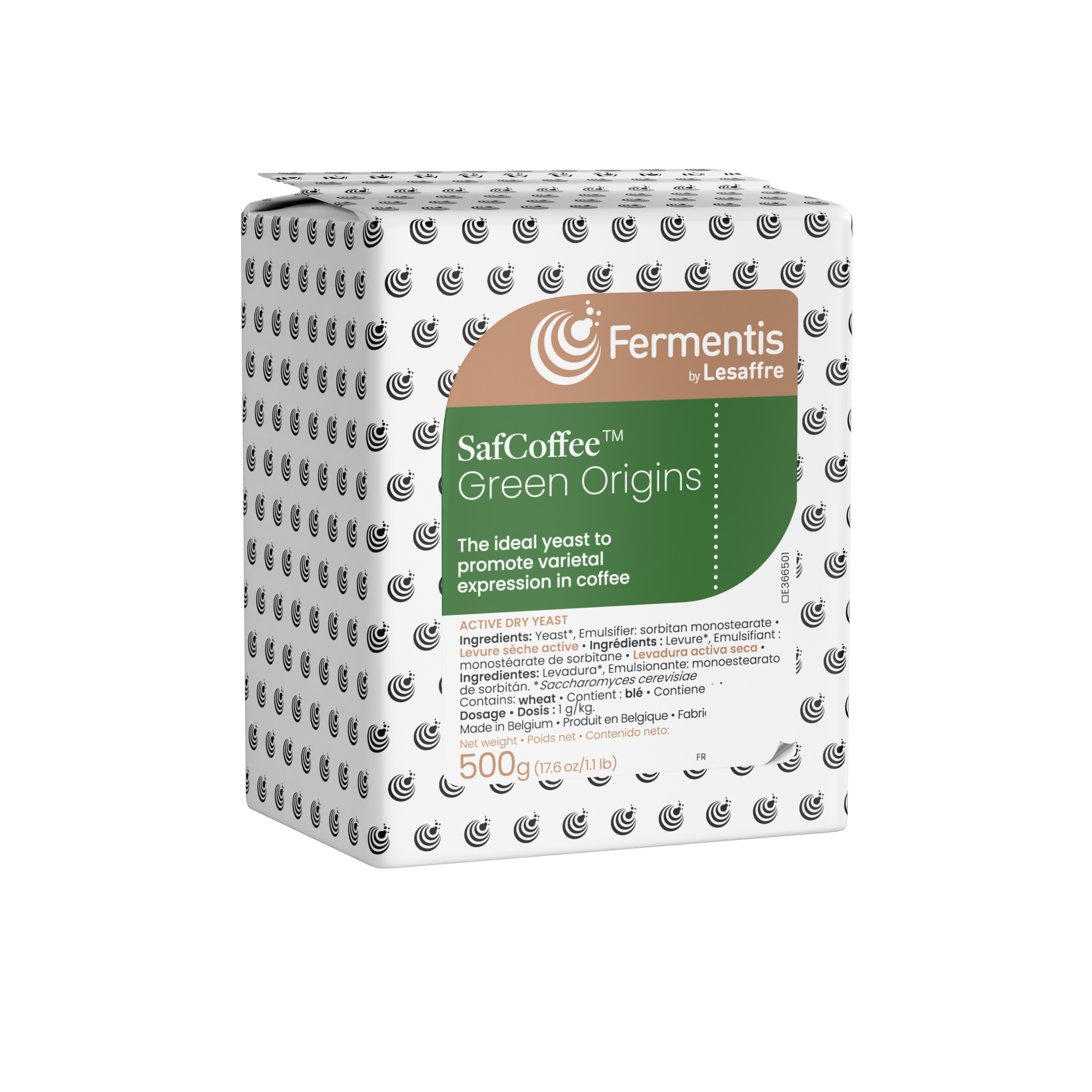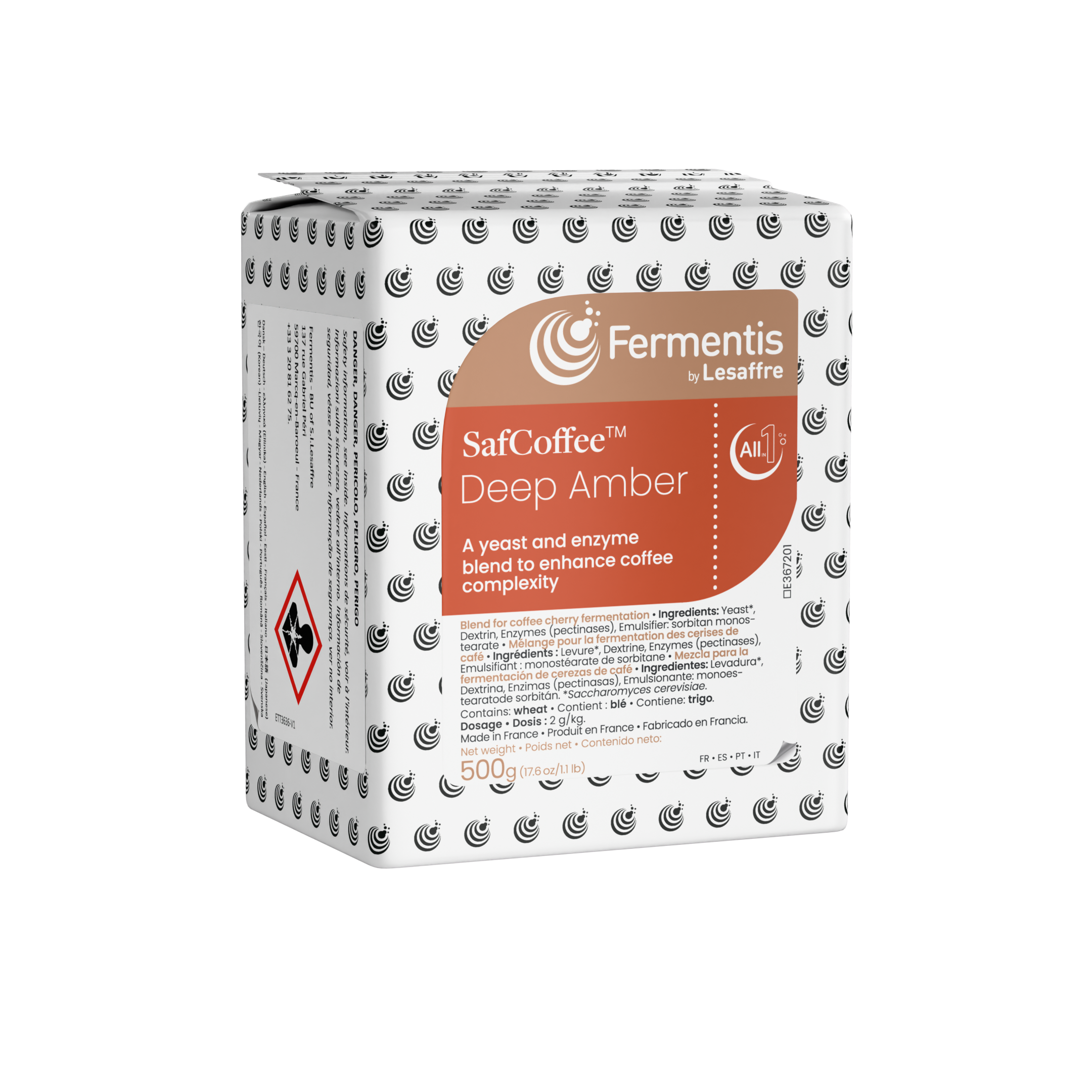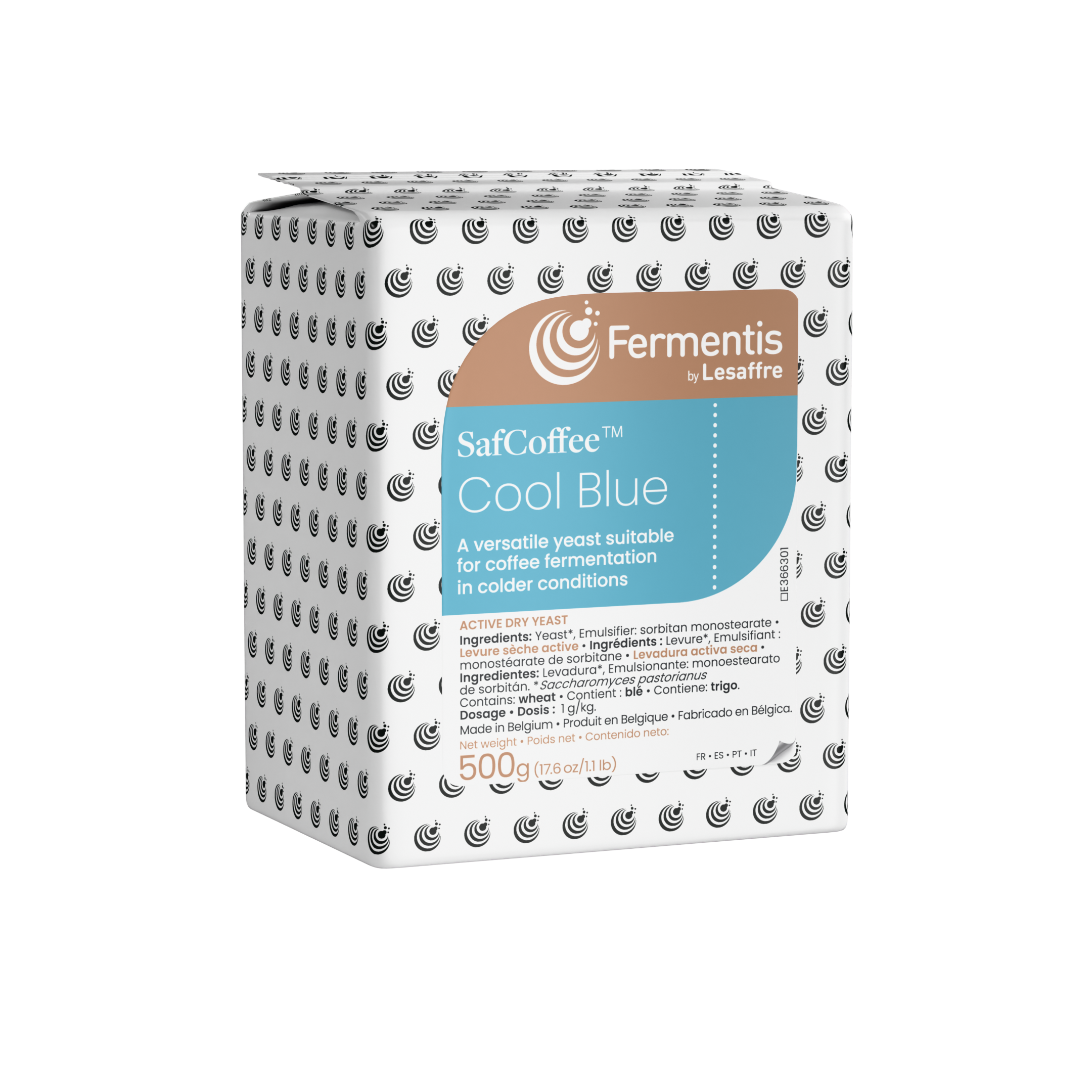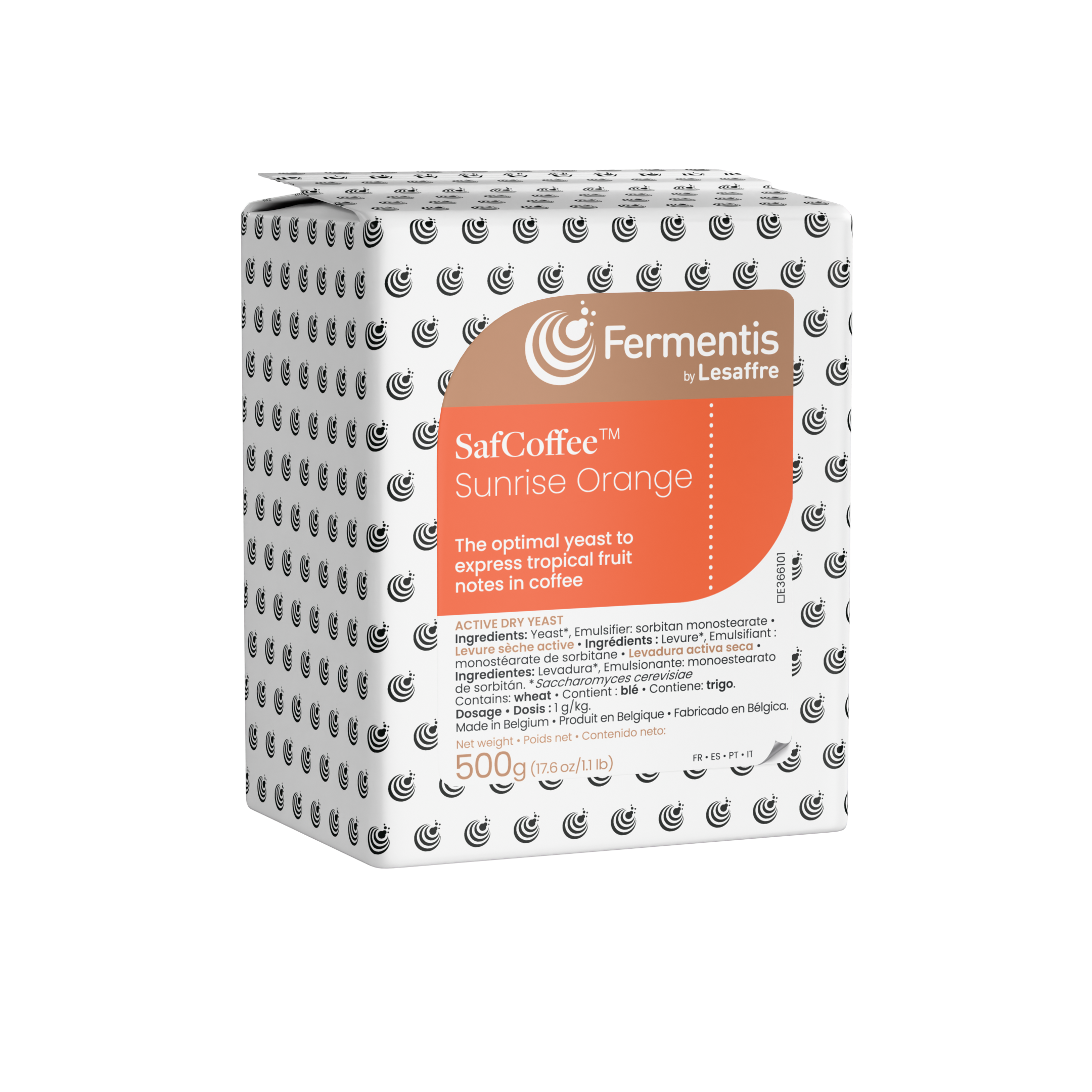FOR FRESH, CLEAN AND MINERAL SPARKLING WINES
SafŒno™ SPK 05 has been selected by Fermentis R&D for its ability to withstand difficult fermentation conditions and to contribute positively to the wine’s aromatic character. SafOEno™ SPK 05 is particularly suited to the production of fresh, clean, and mineral sparkling wines.
Dosage: Still white wines: 20 g/hL (1.67 lb/1000 gal); Prise de mousse: specific protocol upon request.
Ingredients: Yeast (Saccharomyces cerevisiae*), Emulsifier: Sorbitan monostearate (E/INS 491)
*According to « Revisiting the taxonomic synonyms and populations of Saccharomyces cerevisiae – Phylogeny, Phenotypes, Ecology and Domestication. » Pontes A., Hutzler M., Brito P.H. and Sampaio J.P., 2020 and « Genome Diversity and Evolution in the Budding Yeasts (Saccharomycotina). Genetics. » Dujon B.A., Louis E.J., 2017 ; 206(2):717‐750.
SafŒno™ SPK 05 sensory features
For premium white base wines to produce clean and mineral sparkling wines:
Thanks to its impeccable fermentation abilities, SafOEno™ SPK 05 allows the production of white wines with clean, fresh, and mineral profiles. SafOEno™ SPK 05 is considered a clean fermenter having strong fermentation kinetics over a wide range of temperatures and with low nitrogen demands.
For « Prise de mousse » for all types of sparkling wines (Champagne, Prosecco, Crémants…). For the secondary fermentation (Prise de mousse), SafOEno™ SPK 05 shows fast and regular kinetics even at low temperatures (14°C/57.2°F) and allows to quickly produce elegant, fresh, and clean sparkling wines.
Thanks to its exceptional technical qualities, SafOEno™ SPK 05 is recommended for both primary fermentation and for the Prise de Mousse.
o Country: Italy.
o Grape variety: Grillo.
o Vintage: 2020.
Chemical characteristics of the wine after alcoholic fermentation:
– TAV: 10.68% v/v,
– pH: 3.06,
– total acidity: 7.51 g/L H2SO4,
– volatile acidity: 0.27 g/L H2SO4,
– malic acid: 2 g/L.
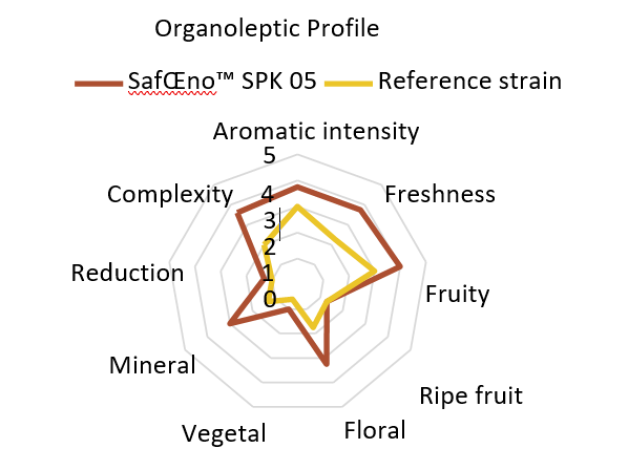
SafŒno™ SPK 05 allowed obtaining a white wine (base wine type – low pH and low alcohol) with a balanced aromatic profile with fresh, floral, and mineral notes. The wine was preferred by the tasters for its overall quality, freshness, and cleanness.
SafŒno™ SPK 05
Fermentation abilities:
• High implantation ability
• Medium lag phase
• Fast and regular fermentative kinetics (first fermentation and Prise de Mousse)
• Maximum ethanol tolerance: up to 15% vol./vol.
• Recommended range of fermentation temperature: 10-30°C (50-86°F)
• Strong ability to ferment under stressful conditions of low pH (2.8-2.9) and low temperature
• Low nitrogen requirements: Ratio YAN (mg/L) / Sugars (g/L) = 0.7-0.8
Metabolic Characteristics:
• Low production of volatile acidity
• Medium malic acid consumption (20% of initial concentration)
• High SO2 resistance (between 50 and 75 mg/L)
• Very low production of acetaldehyde, SO2 and H2S
The Lesaffre know-how and continuous yeast production process improvement generates an exceptional quality of dry yeasts able to resist a very wide range of uses, including by-passing acclimatization, cold or no rehydration conditions, without affecting their viability, kinetic and/or analytical profile. Winemakers can choose to use our E2UTM yeast with the process that fits best their needs:
- Direct inoculation: Inoculate the desired quantity of yeast directly into the must in the fermentation tank, taking care to homogenize the entire volume. In white or rosé wines, ideally, sprinkle directly the yeast into the fermentation tank during the filling (after settling) to ensure a good homogenization. Alternatively pour the desired quantity of yeast on the surface of at least 10 times their weight of must. Gently stir to avoid lumps. Immediately transfer into the tank and homogenize the entire volume.
- With prior rehydration and potential acclimatization: Gently pour the desired quantity of yeast into 10 times its weight of tap water at 15-37°C (59-98.6°F). Gently stir to avoid the formation of lumps. Leave it to rest for 20 minutes and incorporate the yeast starter to the fermentation tank with homogenization. Following the rehydration, it is possible to continue with acclimatization by incorporating to the yeast starter ½ of a volume of must and leave it to rest for 10 minutes. Repeat the operation until the temperature difference between the fermentation tank and the yeast starter culture is less than 10°C (50°F).
Packaging
- Cardboard box of 20 vacuum-packed sachets of 500g / 1.1 lb each (Full box net weight: 10 kg / 22.05 lb)
- Cardboard box of 1 vacuum-packed 10kg / 22.05 lb (Full box net weight: 10kg / 22.05 lb)
Guarantee
The product must be stored/transported in dry conditions and protected from direct sunlight. For less than 6 months, the product can be stored/transported at ambient temperature below 25°C (77°F) without affecting its performances. Peaks up to 40°C (104°F) are allowed for a limited period of time (less than 5 days). Fermentis recommends a long-term storage at a controlled temperature (below 15°C/59°F), once the product arrives to the final destination. Fermentis guarantees the product complies with OIV specifications until its Best Before End Date in the storage conditions mentioned above. The product is also authorized as per TTB.
Each Fermentis yeast is developed under a specific production scheme and benefits from the know-how of the Lesaffre group, world leader in yeast manufacturing. This guarantees the highest microbiological purity and maximum fermentation activity.
The information provided by Fermentis is for informational purposes to the attention of professionals only. We make no representation or warranty of any kind, express or implied, regarding the information: regulatory and intellectual property requirements (including product use and claims) shall be reviewed locally for their particular purposes.











